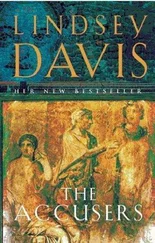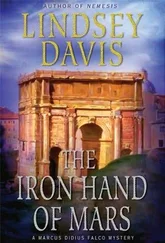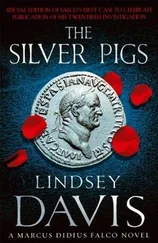Lindsey Davis - Graveyard of the Hesperides
Здесь есть возможность читать онлайн «Lindsey Davis - Graveyard of the Hesperides» весь текст электронной книги совершенно бесплатно (целиком полную версию без сокращений). В некоторых случаях можно слушать аудио, скачать через торрент в формате fb2 и присутствует краткое содержание. Год выпуска: 0101, ISBN: 0101, Издательство: St. Martin, Жанр: Исторический детектив, на английском языке. Описание произведения, (предисловие) а так же отзывы посетителей доступны на портале библиотеки ЛибКат.
- Название:Graveyard of the Hesperides
- Автор:
- Издательство:St. Martin
- Жанр:
- Год:0101
- ISBN:9781466891449
- Рейтинг книги:5 / 5. Голосов: 1
-
Избранное:Добавить в избранное
- Отзывы:
-
Ваша оценка:
- 100
- 1
- 2
- 3
- 4
- 5
Graveyard of the Hesperides: краткое содержание, описание и аннотация
Предлагаем к чтению аннотацию, описание, краткое содержание или предисловие (зависит от того, что написал сам автор книги «Graveyard of the Hesperides»). Если вы не нашли необходимую информацию о книге — напишите в комментариях, мы постараемся отыскать её.
Graveyard of the Hesperides — читать онлайн бесплатно полную книгу (весь текст) целиком
Ниже представлен текст книги, разбитый по страницам. Система сохранения места последней прочитанной страницы, позволяет с удобством читать онлайн бесплатно книгу «Graveyard of the Hesperides», без необходимости каждый раз заново искать на чём Вы остановились. Поставьте закладку, и сможете в любой момент перейти на страницу, на которой закончили чтение.
Интервал:
Закладка:
“Who said you were invited?”
“Don’t worry, I’ll invite us myself. Pullia will be delighted.” His wife, Pullia, was a surprisingly nice woman, though she must have been sozzled the day she agreed to share her life with Morellus. I wondered whether they would bring the four little porridge-flingers. Probably have to. They were children no aunts would willingly look after. Anyway, Pullia liked them to all go out as a family. It would increase morale, she hoped, poor optimistic woman.
Tiberius placed the rubble basket on the table, a heavy planked affair onto which officers traditionally slammed the heads of witnesses they were interrogating. Having a smashed face was supposed to encourage people to tell the truth.
“Presents? What’s this, Legate?”
“We are hoping you can tell us. We think it may be some of the bones of a dead waitress, but as Albia’s bright sister remarked, if that’s right, she had interestingly mismatched legs.”
“Just my type. I love a woman with a physical quirk. Let’s see your luscious legs, sweetie!” Morellus hauled himself upright so he could peer salaciously into the basket. Pullia was in fact a good-looking woman; there was nothing wrong with her. Well, except for her judgment in men.
Morellus upended the basket, scattering the bones all over the table where, I knew, he regularly ate and drank. “Ooh, these will look attractive in your cabinet of curiosities, Manlius Faustus. I take it you’ll display them for visitors, when you and the luscious Albia socialize?”
Faustus went along with it genially. “So how shall we label them?”
Morellus shifted bones left and right on the tabletop, sorting them. His movements were swift and decisive. “Woman’s thigh, woman’s ribs, male thigh bone, indeterminate spine knuckle, probably toe-could be anybody’s-female pelvis, child-bearing age, looks as if she has carried some to term, poor unhappy cow…” He continued like this through most of our cargo before speeding through the last few items. “Can’t tell, can’t decide, can’t tell, could be a dog, bound to be poultry.”
“You’re good!” commented Faustus.
“Practice. Tell you one thing.”
“What?” I asked since he had clearly paused for emphasis.
“This one, this male thigh bone, has been sawn.”
“Deliberate dismemberment?” asked Faustus. Nodding, Morellus showed him the cut. “So we can assume at least one of the bodies, perhaps not the dog or the chicken, died from foul play?”
“Well,” Morellus drawled, being clever. “Whether you call it foul play will depend if your victim was a bad waitress. If she often fiddled bar bills, I’d call it justice.”
XVI
It was now the hottest part of a sultry summer day. We were up on the Aventine, a long way from the crime scene but temptingly near my apartment. We went there. Supposedly we wanted to consider options.
As we walked the short distance from the station house, I wondered why the street life in your own area always seems safer even if it’s no more salubrious than other places. There must be as many sordid bars here as in the Ten Traders enclave. The food stalls were as dowdy, their fare as unappetizing. But where you live, in general the whores don’t shout invitations at you. You know, so you mainly dodge, the pickpockets. Feral dogs ignore your passing. Somehow you just feel more confident, less anxious, more at home, less oppressed.
The Eagle Building, Fountain Court, was nearing the end of its long life. Constructed in the Republic as a six-story block of basic tenements, its decayed structure now creaked at every puff of breeze so that mold and dust flittered from the increasing crannies. Fortunately in August breezes rarely blew. As the hot sun baked the minimal apartments, remnants of their meager paint were flaking more every day. The building stayed upright only because it had settled like a plant on its rootstock over many years. But one slight shock and it was done for. If a god laughed in Olympus, it would crash.
Tenants had thinned out recently as my father, who owned Fountain Court, tried to find them other places to live. He had a conscience. Nobody was grateful, but he carried on, seeking to edge them out elsewhere before he finalized a sale to a senator who would pull down the apartments to build his own private house. He was Spanish. Pa had told him this was a desirable area. According to Falco, the Thirteenth District was crammed with amenities.
It is true that on the Aventine there are many temples. Sometimes you can’t move in the local bars for disreputable priests engaged in illegal gambling with their awful acolytes. A spotty altar boy loses, goes mad about it, and cuts off a priest’s ear with a fruit knife. If the gossips are lucky, it is subsequently discovered that the priest was using loaded dice … Lots to talk about.
I concede that a senator could be very private on the noisy, smelly, rumbustious Mons Aventinus. Nobody would ever come to bother him at his house. Maybe Ulpius Trajanus was not so daft.
While the Eagle Building still remained, I kept my rent-free niche in one of the better apartments (where the comparative “better” is a reckless term to use). I had lived there during my first marriage and ever since; I also used an office on the top floor, which had once been Father’s. There would be nostalgic pangs for both of us when we left Fountain Court for good, but it was time. Nobody wants to be crushed under collapsing rubble.
Father declared he would reject any compensation suits from hurt tenants because he had given formal notice that the place might fall down any day. Staying on was now at their own risk. My two barrister uncles, the Camilli, chortled as they said they looked forward to fighting that one on behalf of the tenants. In the family we viewed Aulus and Quintus as wild boys, though there was evidence that they knew how to choose winnable cases.
When Tiberius and I arrived that day, Rodan the porter was nowhere to be seen. That saved me having to ask whether he had found another job yet, but it meant anyone could walk in. With luck, burglars did not operate in the heat of midday. Indeed, some of them lived upstairs so they did their thieving elsewhere to avoid annoying their own neighbors. Otherwise, when property is half-empty it tends to exude a message that there will not be much worth stealing. The Eagle Building teetered on the cusp, visibly dying but not yet sufficiently deserted to attract squatters or moonlit salvage teams.
Tiberius and I went into my apartment.
In the bedroom, I quickly sorted earrings to take away to the Viminal. Tiberius followed me quietly. I straightened up from the side table.
“Hmm. Options!” he remarked, sliding my dress brooch to one side so he could caress my bare shoulder.
We had not been at ease in our hired room, which we could guess had been the scene of many purely commercial couplings. We had not liked the narrow bed with its sagging, much used, wool-stuffed mattress. Here we were now, standing together beside our own fine antique bed, on an afternoon when it was still too warm to walk about outside for any distance. We also had that secret thrill of nobody knowing where we were …
I said in a businesslike voice, “It’s obvious what we have to do next. Tiberius Manlius, you must summon your workforce from wherever they are snoozing over midday, make them bring all the spades and picks they have in the yard, then we must dig up every foot of the outside space at the Hesperides to see who else is buried there.”
“I could do that.” Tiberius nuzzled my neck.
Enjoying his attention, I softened. “Or collect them later?”
“Absolutely. Flavia Albia, I would never make the men go outside in stonking heat. I care about their welfare. I don’t want them fainting.”
Читать дальшеИнтервал:
Закладка:
Похожие книги на «Graveyard of the Hesperides»
Представляем Вашему вниманию похожие книги на «Graveyard of the Hesperides» списком для выбора. Мы отобрали схожую по названию и смыслу литературу в надежде предоставить читателям больше вариантов отыскать новые, интересные, ещё непрочитанные произведения.
Обсуждение, отзывы о книге «Graveyard of the Hesperides» и просто собственные мнения читателей. Оставьте ваши комментарии, напишите, что Вы думаете о произведении, его смысле или главных героях. Укажите что конкретно понравилось, а что нет, и почему Вы так считаете.












